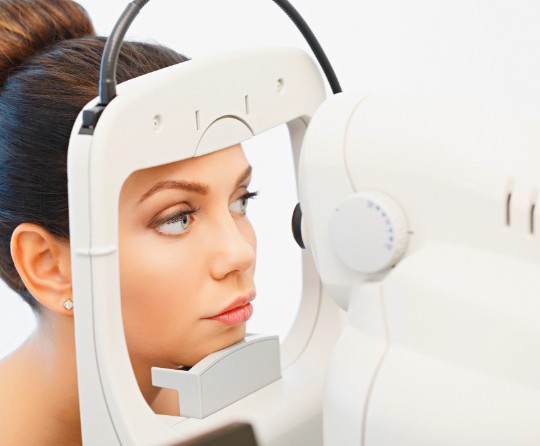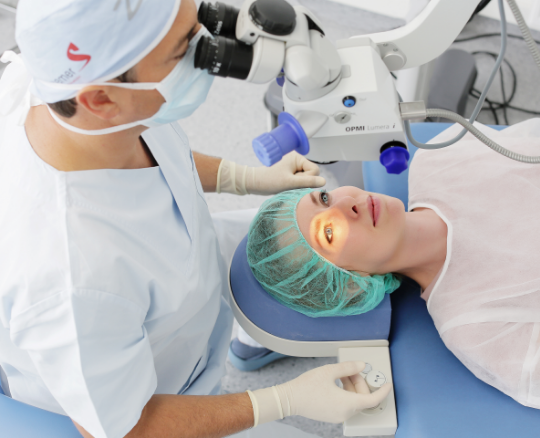Escape the hassle of reading glasses and turn back the clock on your eyes
- We restore clarity of vision so you don’t have to put up with second-rate eyes




Gain visual freedom with our Swiss method for exceptional laser eye surgery
Reading glasses surgery with uncompromised quality and precision in Vienna and Linz
There are several methods available to correct presbyopia, the age-related need for reading glasses.
We can perform all treatments on an outpatient basis. All treatments are completely pain-free.
Monovision or PresbyMax is suitable for presbyopic people who can adapt well to the procedure. The procedure involves correcting one eye for distance vision and the other eye for near vision. The brain then merges these two images to create one view of the world.
Lens replacement makes sense if the patient is not suitable for laser correction, is over 50 years old and the natural lens is already slightly cloudy (incipient cataract).
During refractive lens exchange, we remove the natural lens using computer-controlled ultrasound. We replace the old lens with a suitable artificial lens.
At EyeLaser, we use state-of-the-art multifocal (trifocal lenses) and EDOF lenses. Multifocal lenses enable good near, intermediate and far vision, and EDOF Lenses enable good near and intermediate vision with less side effects.
Just a few days after the procedure, you can see very well without glasses.
If you have a residual visual defect after a lens exchange, we can usually correct this with laser correction.
Usually, people between the ages of 35 and 65 who are short-sighted and have presbyopia are suitable for monovision.
In this treatment, we subject each eye to different optical power corrections. We prepare one eye for long-sightedness and the other for short-sightedness. So, in other words, one short-sighted and one far-sighted eye is artificially produced.
We correct the dominant eye for far distances and the other for things that are near. Some patients cope well with this method, and others feel uncomfortable. Our job is to figure out your preferences before the surgery using simulated spectacles or contact lenses. Depending on your professional and personal requirements, you can decide whether monovision is an option for you.
We can perform monovision in different ways. We can use contact lenses, laser eye treatment or intraocular lens implantation. Generally, people between the ages of 35 and 65 are suitable for monovision – mainly those who are nearsighted and in whom presbyopia has already set in.
In the best-case scenario, monovision will allow considerable independence from spectacles or reading glasses. An average result would be reduced independence from reading glasses.
Monovision steps:
The preparation
We will provide you with contact lenses, which we will individually adapt to your needs. This will simulate the possible outcome of the treatment over one to two weeks. During this period, you will be able to judge whether monovision is an option for you.
The treatment
In monovision, you undergo LASIK surgery or implantation of Phakic Lenses (ICLs). We correct your dominant eye for distance in both methods and your non-dominant eye for near vision.
PresbyMAX is a modern laser eye surgery method for the treatment of presbyopia.
The PresbyMAX laser eye treatment only takes a few minutes and does not touch or replace the delicate eye lens.
Instead, we reshape the cornea using laser pulses – precise, gentle and rapid.
The principle of the PresbyMAX method is like that of contact or intraocular lenses. A computer calculates the eye focal points. The laser then uses these calculations to shape the cornea for near vision in the center and far vision towards the periphery. This results in good visual acuity at all distances – whether near or far.
There are various treatment options for the PresbyMAX method, which we would be happy to explain to you at your initial assessment.
Refractive lens exchange is used primarily for patients with early signs of cataracts. Or for people with severe nearsightedness, farsightedness, presbyopia, and astigmatism.
We remove the natural lens (cloudy in cataracts) through a small incision on the cornea and insert a lens made of compatible plastic (acrylate) in its place.
We will determine which method of lens surgery is best for you in a personal consultation including an ophthalmological examination by a specialist.

Millions of people around the world have gained their freedom from glasses and contacts but not everyone’s eyes are suitable for treatment. Book an assessment below and find out if you’re suitable and which treatment can help you best:
BOOK AN ASSESSMENTWe are proud to be associated with top quality private medical insurance





Discover everything you need to know about reading glasses surgery
PresbyMAX technology
We perform the PresbyMAX laser eye surgery procedure using the Schwind Amaris 1050RS laser platform. It’s fast and has 7-dimensional eye tracking. This means it has an incredible level of precision which maximises visual comfort and total independence of glasses.
Refractive lens exchange technology
We can tailor the lenses to suit your individual needs after your refractive lens exchange surgery. For example:
Laser eye surgery for presbyopia
| Without any other ametropia | PresbyMax/ Femto-LASIK/ Monovision / Lens exchange / ICL |
|---|---|
| Hyperopia / myopia +3 to -5 dpt | PresbyMax / Femto-LASIK / Monovision/ Presbyopia-LASIK/ Lens exchange |
| All visual defects | Lens exchange with monofocal or multifocal implants |
Monovision risks and side effects
Separation of the functions of the two eyes is usually well accepted – if both eyes work together perfectly, the result is a well perceived overall picture for the brain. Although there are effects on spatial vision, these are not disadvantageous for most activities. Depending on your wishes and personal preferences, the preliminary examination will tell you whether this method is suitable for you.
In any case, the brain needs time after the treatment to get used to the new conditions. If you notice after the treatment that the result is not satisfactory for you after all, both eyes can be adjusted for distance vision afterwards. For near vision, you would still need reading glasses. We will be happy to inform you about any other risks.
97% to be precise (we’re Swiss. We measure everything). But don’t take our word for it…
Discover Austria’s most popular laser eye surgeons in the heart of Vienna and Linz

Things like age, eye shape, history and lifestyle make an eye treatment perfect for one person, but not another. Find out which treatment (if any) could free you from glasses and contacts
Take a quiz